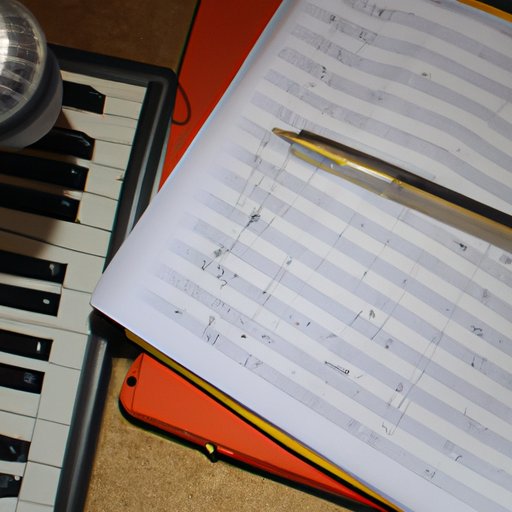Introduction
Music writing is the process of creating songs, melodies, or instrumental pieces. It’s an art form that has been around for centuries, but it has become increasingly popular in recent years. Whether you’re a beginner who wants to learn how to write music, or an experienced musician looking to refine their skills, this article will provide you with all the information you need to get started.
Learn the Basics
Before you can start writing music, it’s important to understand the basics. That includes note values, chords, and scales. Note values refer to the duration of a note, such as a quarter note or eighth note. Chords are combinations of notes that create a distinct sound. And scales are sequences of notes that create a melody.
It’s also helpful to learn about time signatures and tempo. Time signature is the number of beats per measure, and tempo is the speed of the beat. Knowing these basics will help you create more dynamic and interesting pieces of music.
Find Your Inspiration
Once you have the basics down, it’s time to find your inspiration. Listen to different genres of music, visit a music store, and attend live concerts. This will help you get a better understanding of music and the different types of sounds that exist. It will also give you ideas on how to create your own unique pieces of music.
Experiment with Instruments
Now it’s time to start experimenting with different instruments. There are so many different types of instruments available, from pianos to guitars to drums. Take some time to explore each type of instrument and find the one that resonates the most with you. You don’t have to be an expert to start writing music, but it helps to have some basic knowledge of the instrument you’re using.
Practice Regularly
Writing music takes practice. Set aside some time each day to practice your instrument and hone your craft. If you’re just starting out, try writing simple melodies or chord progressions. As you get more comfortable, try experimenting with different rhythms and keys. The more you practice, the more confident you’ll become in your abilities.
Record Your Ideas
As you’re practicing and writing music, it’s important to record your ideas. Invest in a good recording device or software so you can capture your musical ideas before they slip away. This will help you stay organized and make it easier to go back and review your work.
Conclusion
Writing music can be a rewarding experience, but it takes dedication and practice. This article has provided you with the basics of music writing and tips for getting started. Now it’s up to you to take the next step and start writing your own music. With hard work and dedication, you’ll be able to create beautiful pieces of music that you can be proud of.
(Note: Is this article not meeting your expectations? Do you have knowledge or insights to share? Unlock new opportunities and expand your reach by joining our authors team. Click Registration to join us and share your expertise with our readers.)
